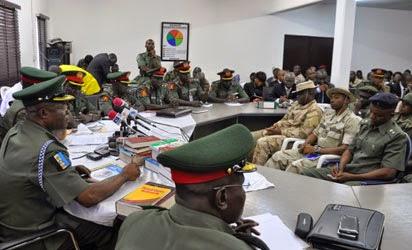The Nigerian Army has established a general court martial for the trial of five officers and 20 soldiers of the 82 Division of the Nigerian Army in Enugu.
The offences of the accused army personnel include, murder, defilement, manslaughter, extortion and assault on civilians.
Inaugurating the court martial, President of the General Court Martial, Brig. Gen. Buhari Sadisu, said that the court martial was convened by the General Officer Commanding (GOC), 82 Division, Maj. Gen. Oluyemi Olatoye.
Brig. Gen Buhari said that it was pertinent to note that a court martial is one of the instruments used in the armed forces to maintain discipline.
He said under the court martial, the army officers military and soldiers alleged to have committed offences will be tried and if found guilty, punished in accordance to the laws criminalizing such offences.
However, Brig. Gen Buhari explained that in the event, the prosecution fails to establish the allegations against the offenders, the court will discharge and acquit the accused army officers and soldiers.
He assured that the court martial will be guided throughout the trial, by the principles of natural justice and fair hearing, adding that it will also be guided by the 1999 constitution and other extant laws, and procedures related to the trial.
Read also: Nigerian Army arrests four ambazonia rebel suspects in Taraba State
Similarly, Brig. Gen. Buhari said the president of the court martial will be free from any external influence, and will afford the defendants adequate time and facility to defend themselves.
“Under our criminal justice system, it is better for 99 guilty persons to be set free, than for one innocent person to be convicted.
“Accordingly, I hereby assure you that the court martial will strive to do justice in your cases, by ensuring that evidence presented before her are judiciously and fairly evaluated.
“This is in order to avoid a situation where an innocent person is made to suffer unjustly,” he said.
The court martial has the same power and concurrent mandate as the federal and state high courts, as its decisions can only be challenged at the court of appeal.





